辽宁省沈阳市第二十一中学高中英语Module5Alessoninlab1教案外研版必修1
辽宁沈阳第二十一中学英语必修I外研版Module 1新教学案(6)

Give the students some time to discuss the questions and try to report their own ideas. Then the teacher make a summary.
1 amazed bored tired
2 embarrassed
3 disappointed excited interested
Play the tape for the students and ask the to find the differences and try to imitate the pronunciation . Ask the students to find out the principles.
辽宁沈阳第二十一中学英语必修 外研版Module 1新教学案(6)
Teaching content
a) Grammar 2
b) Pronunciation
c) Speaking
d) writing
Teaching aims and demands
a) get the students to master the uses of –ing form and –ed form
b) have a dictation about the words and sentences in activity 2 in Listening and vocabulary.
辽宁省沈阳市第二十一中学高中英语 Module 5 知识点讲解 外研版必修1
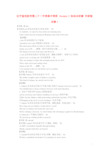
辽宁省沈阳市第二十一中学高中英语Module 5 知识点讲解外研版必修1【词条1】aim【点拨】aim常作名词,意为"目的,目标"。
如:As students, we must be clear about our learning aims.I don’t know his aim of going to Beijing at this time of the year.【拓展】1.aim作名词常用于以下短语:①achieve one’s aim"实现某人的目标"。
如:She made great efforts in order to achieve her aims.②take aim at"向……瞄准;把矛头或目标对准……"。
如:The hunter took aim at the tiger and shot at it.2. aim还可作动词,意为"目的是,旨在;瞄准,对准等"。
常用于以下结构:①aim to do / at doing s th."旨在做某事"。
如:They are aiming to reduce the unemployment rate by 50%.These steps aim at preventing crime.②aim at sth."向……瞄准"。
如:I was aiming at the tree but hit the car by accident.【词条2】balance【点拨】balance可作名词,意为"天平"。
如:My mother bought a pair of balances yesterday.This kind of balance are mostly used in labs.【拓展】1. balance作名词,还可意为"平衡,均衡",常用于balance between A and B。
辽宁省沈阳市第二十一中学高中英语 ModuLe 5 A Lesson in a Lab 学案 外研版必修1
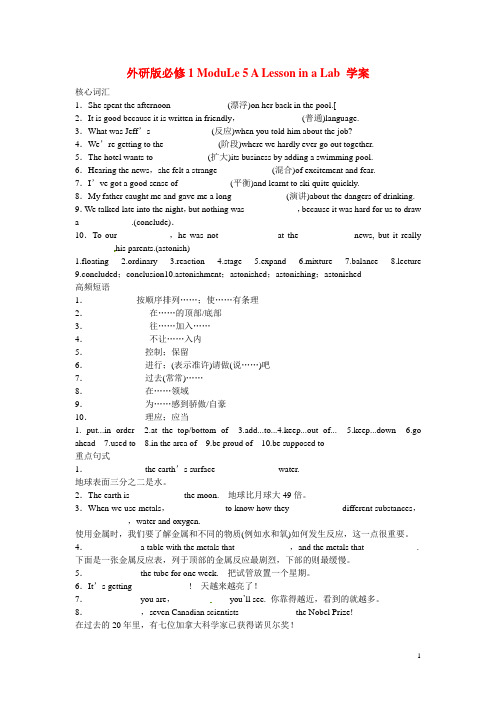
外研版必修1 ModuLe 5 A Lesson in a Lab 学案核心词汇1.She spent the afternoon_____________(漂浮)on her back in the pool.[2.It is good because it is written in friendly,______________(普通)language.3.What was Jeff’s______________(反应)when you told him about the job?4.We’re getting to the ____________(阶段)where we hardly ever go out together.5.The hotel wants to ____________(扩大)its business by adding a swimming pool. 6.Hearing the news,she felt a strange ____________(混合)of excitement and fear.7.I’ve got a good sense of____________(平衡)and learnt to ski quite quickly.8.My father caught me and gave me a long____________ (演讲)about the dangers of drinking. 9.We talked late into the night,but nothing was____________,because it was hard for us to draw a____________.(conclude).10.To our____________,he was not ____________ at the ____________news, but it really ________ his parents.(astonish)1.floating2.ordinary3.reaction4.stage5.expand6.mixture7.balance8.lecture9.concluded;conclusion10.astonishment;astonished;astonishing;astonished高频短语1.___________按顺序排列……;使……有条理2.___________ 在……的顶部/底部3.___________ 往……加入……4.___________ 不让……入内5.___________ 控制;保留6.___________ 进行;(表示准许)请做(说……)吧7.___________ 过去(常常)……8.___________ 在……领域9.___________ 为……感到骄傲/自豪10.__________ 理应;应当1. put...in order2.at the top/bottom of3.add...to...4.keep...out of...5.keep...down6.go aheaded to8.in the area of9.be proud of10.be supposed to重点句式1._____________the earth’s surface ______________water.地球表面三分之二是水。
高中英语新课标外研版必修1教案(Module 5 1st period)
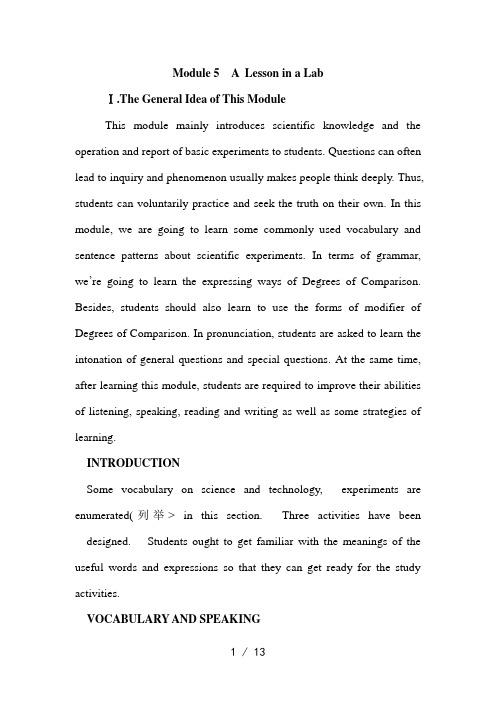
Module 5 A Lesson in a LabⅠ.The General Idea of This ModuleThis module mainly introduces scientific knowledge and the operation and report of basic experiments to students. Questions can often lead to inquiry and phenomenon usually makes people think deeply. Thus, students can voluntarily practice and seek the truth on their own. In this module, we are going to learn some commonly used vocabulary and sentence patterns about scientific experiments. In terms of grammar, we’re going to learn the expressing ways of Degrees of Comparison. Besides, students should also learn to use the forms of modifier of Degrees of Comparison. In pronunciation, students are asked to learn the intonation of general questions and special questions. At the same time, after learning this module, students are required to improve their abilities of listening, speaking, reading and writing as well as some strategies of learning.INTRODUCTIONSome vocabulary on science and technology,experiments are enumerated(列举> in this section.Three activities have been designed. Students ought to get familiar with the meanings of the useful words and expressions so that they can get ready for the study activities.VOCABULARY AND SPEAKINGThis part introduces vocabulary of numerals.Besides,five activities have been designed here for the students to distinguish and calculate the numbers and percentage.GRAMMAR 1In this part,we will learn degrees of comparison of the adjectives. It mainly deals with the expressing ways of multiple.READING AND VOCABULARYThis section leads to some words and useful expressions concerning the topic of this module.It also introduces oxide reaction of metals. The exercises designed according to the reading text enable the students to learn to use the relevant vocabulary by doing the exercises. VOCABULARYThis section supplies vocabulary on experimental apparatus and gives us the reading method of fractions.It also supplies us some relevant activities.LISTENING AND WRITINGThe listening material is a dialogue of teachers and students who are doing an experiment.It gives us the activity on relevant experiment as well.GRAMMAR 2This section mainly introduces three kinds of usage of degrees of comparison of the adjectives.PRONUNCIATIONIn this part,the students are required to master the intonation of general questions and special questions.EVERYDAY ENGLISHIn this part,the students shall learn several useful expressions of daily English.That is:“Where do we go from here?”“Keep the noi se down.”“You’ve got it.”“It’s your turn.”“Go ahead!”FUNCTIONIn writing,the students are asked to grasp the use of first,next, after that,lastly and so on in a paragraph.They are also required to learn the usage of comma.CULTURAL CORNERThe students must learn the teaching conditions of senior high school education of Canada by reading this passage.TASKIt requires students to work in pairs.Furthermore,the students are asked to write an experimental report by recalling the experiments carried out in class and going over the content of reading. MODULE FILEThis section summarizes the words and expressions,grammar, pronunciation and everyday Egnlish learnt in this module.Ⅱ.Three-Dimensional Goals1.Knowledge and skills(1>Be able to master the key vocabulary and read the text fluently. Get to know something about science and technology,experimental reports.(2>The students are required to understand and master the usage of tractions and degrees of comparison of adverbs.2.Process and methods(1>Learn independently,under the teacher’s guidance.Try to get to know knowledge concerning experiments on science and technology.(2>Inquiry and activity.Students are required to understand its importance of scientific knowledge.The students will be aroused the enthusiasm for observing and analyzing problems.3.Emotion and valuesThe materials in this part can help students change their attitude towards study and arouse their interest of learning so that they can form their own goals of study.Ⅲ.Teaching Important PointsStudents should get to know some scientific knowledge and draw a conclusion by doing some experiments.Master relevant vocabulary and phrases and improve the students’abilities of listening,speaking,reading and writing.Ⅳ.Teaching Difficult PointHow to improve the students’ ability of writing effectively.Ⅴ.Preparation of Teaching Aidsa tape recorder,multimedia, a computer and a slide projectorⅥ.Teaching Timefive periodsThe first period:Introduction,V ocabulary and SpeakingThe second and the third period:Reading and V ocabularyThe fourth period:V ocabulary,Listening and Writing, Grammar 1-2The fifth period:Pronunciation Everyday English,Function and Cultural CornerThe First PeriodThe General Idea of This PeriodIn this period,we are going to learn to say some large numbers quickly and correctly. And we will learn to use some new words.Teaching Aims1.Learn and master the following:Learn the meaning of the following words:liquid,expand, contract,substance,mixture,oxygen,electricity.Learn to say the large numbers in English.2.Develop the students’speaking ability by listening andspeaking.Teaching Important Points1.Train the students’ abilities of listening and speaking.2.Enable the Ss to recognize the numbers,fractions and percentages.Teaching Difficult PointHow to improve the students’ speaking ability.Teaching MethodsIndividual and pair work.Teaching Aids1. a computer2. a projector3.the blackboardTeaching ProceduresStep 1 Greetings and Lead-inT:Hello,everyone.Ss:Hello,Mr Li.T:Sit down,please. Now in this unit we are going to learn something about general science and learn how to express the numbers. First of all,let’s learn the new words. (Show the new words on the screen.>liquid 液体expand 膨胀contract 收缩substance 物质mixture 混合物oxygen 氧气electricity 电T:OK. Please read the new words and find the Chinese meaning for each worD.(The Ss read and look up the words in the vocabulary individually.Teacher makes sure the Ss know the new words. Read the words after you.>Step 2 Choose the correct answers to the quiz.Teacher asks the Ss to look through Part one and judge which statements are true.The Ss read and tick the possible right sentences.T:Now listen and check your answers.The Ss check the answers in pairs.1.a2.a3.a4.a5.b6.b7.bT:Now listen again and check your answers.Step 3 PracticeT:Put the words in pairs or groups individually.(The Ss work on their own.>T:Compare the answers in pairs.1.air—oxygen2.contract—expand3.earth—sun—moon4.gas—liquid—solidStep 4 PracticeTeacher shows the words on the screen. Have the class repeat them. electricity iron metal steel air glassT:Can you find these things in our classroom?(Further questions for them to answer>Which of the above are natural?Which are man-made?Which can be both?T:Work in pairs or groups.(Call back the answers from the class.>1.Electricity,iron,some metals and air are natural.2.Steel,some metals and glass are man-made.3.Electricity and some metals (alloys for example> can be man-made and naturally.Step 5 V ocabulary and speaking1.Look at the numbers.(Show these numbers on the screen. Ask them to say the numbers. The English expression will be given when a student makes the answer.>76seventy-six876eight hundred and seventy-six2876two thousand,eight hundred and seventy-six32 876thirty-two thousand,eight hundred and seventy-six432 876four hundred and thirty-two thousand,eight hundred and seventy-six2.Look and learn SB P42 Part 1By this time,the Ss should know the meaning of “million”.T:Read the numbers. And find the two mistakes.This is a good time the Ss learn how to say the large numbers. Theteacher walks around the class and offers help when necessary.S:I’ve found the errors. The first two numbers are misread.T:You’re right. But how can you say the numbers?S:The first one should be fifty-two million,four hundred and seventy thousand,three hundred and eighty-three.T:Great! What about the second?S:It’s one hundred million.T:Good job!3.Look and sayLook at the following big numbers and say them in English quickly.55 555655 5557 555 50587 555 500987 555 5001 000 000 0004.Listen and writeT:Listen to the following numbers in English and write them down.three thousand,five hundred and forty-sixthirty-three thousand,seven hundred and ninety-sixfive hundred and twenty-two thousand,four hundred and eighty -fivethree million,two hundred and thirty-five thousandThe Ss write in the Arab letter.The teacher collects some of their work and shows it on the real object objector.5.Look at these fractions SB,P42 Part 2T:Now please say these fractions in English.S:Two fifth.T:Is it right?S:No,it’s two fifths.T:Good! Next?S:Five eighths.S:Nine tenths.S:Three eighths.S:Five sixths.T:Who can describe the fractions in Activity 2 as percentages?S:I’ll try. One third is the same as 33.33%.S:Four-fifths is the same as 80%.S:One-tenth is the same as 10%.S:Three-quarters is the same as 75%.S:One half is the same as 50%.S:Two-thirds is the same as 66.66%.S:Two-fifths is the same as 40%.S:Five-eighths is the same as 62.5%.S:Nine-tenths is the same as 90%.S:Three-eighths is the same as 37.5%.S:Five-sixths is the same as 83.33%.T:Good! Your mathematics is excellent!6.PracticeT:Let’s turn to P43, Part 4Read these questions aloud and say the numbers.(Put the Ss into pairs to take turns asking and answering the questions.Circulate,monitor and help where necessary. Call back the answers from the class.>(1>3 000 000(2>48 046 000(3>50 000 000 (4>265 693 096(5>750 375 000 (6>80 000 000Step 6 PracticeT:Work in pairs. Give your partner five sums. Use numbers over a million. Your partner must find the answers. Work out the answers and then say them in words.Step 7 Assignment1.Master the new words we have learned in this class.2.Work in pairs. Look,listen,speak and write the larger numbers,fractions and percentages.Step 8 The design of the writing on the blackboardModule 5 A Lesson in a LabThe First Periodliquid55 555expand655 555 contract7 555 505substance87 555 500mixture987 555 500 oxygen 1 000 000 000electricity Step 9 Activity and InquirySteps Students’ Acting Teacher’s Organizing1 The students are asked to use amixture ofpercentages,additions and fractions,as in the previous activity.Thenwork outthe questions on their own first,butleavethe answers off the paper they writethe questions on. Ask the students to work out the answers independently.2 The students should exchangequestions and writethe answers out on paper as theywould say them(i.e. in words,not just in figures>. The teacher looks around the class, inspecting the students’ activity.3 Take it in turns to ask and answer eachother’s question. Ask the students to carry out the activity seriously.申明:所有资料为本人收集整理,仅限个人学习使用,勿做商业用途。
辽宁省沈阳市第二十一中学高中英语 Module 5 A lesson in lab2教案 外研版必修1 (2)
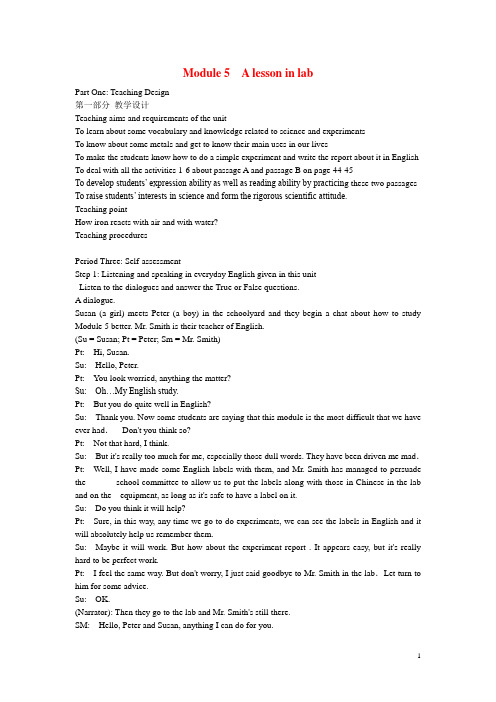
Module 5 A lesson in labPart One: Teaching Design第一部分教学设计Teaching aims and requirements of the unitTo learn about some vocabulary and knowledge related to science and experimentsTo know about some metals and get to know their main uses in our livesTo make the students know how to do a simple experiment and write the report about it in English To deal with all the activities 1-6 about passage A and passage B on page 44-45To develop students’ expression ability as well as reading ability by practicin g these two passages To raise students’ interests in science and form the rigorous scientific attitude.Teaching pointHow iron reacts with air and with water?Teaching proceduresPeriod Three: Self-assessmentStep 1: Listening and speaking in everyday English given in this unitListen to the dialogues and answer the True or False questions.A dialogue.Susan (a girl) meets Peter (a boy) in the schoolyard and they begin a chat about how to study Module 5 better. Mr. Smith is their teacher of English.(Su = Susan; Pt = Peter; Sm = Mr. Smith)Pt: Hi, Susan.Su: Hello, Peter.Pt: You look worried, anything the matter?Su: Oh…My English study.Pt: But you do quite well in English?Su: Thank you. Now some students are saying that this module is the most difficult that we have ever had.Don't you think so?Pt: Not that hard, I think.Su: But it's really too much for me, especially those dull words. They have been driven me mad.Pt: Well, I have made some English labels with them, and Mr. Smith has managed to persuade the school committee to allow us to put the labels along with those in Chinese in the lab and on the equipment, as long as it's safe to have a label on it.Su: Do you think it will help?Pt: Sure, in this way, any time we go to do experiments, we can see the labels in English and it will absolutely help us remember them.Su: Maybe it will work. But how about the experiment report . It appears easy, but it's really hard to be perfect work.Pt: I feel the same way. But don't worry, I just said goodbye to Mr. Smith in the lab.Let turn to him for some advice.Su: OK.(Narrator): Then they go to the lab and Mr. Smith's still there.SM: Hello, Peter and Susan, anything I can do for you.Pt: Susan is worrying about her study of this module.SM: You see, I have finished these labels. They will help you remember the new words.Su: But how about the experiment report? It's really hard to do it well.SM: But it's not so hard? Oh. I see. You've got nothing hard in your English, but in your concept. Pt and Su: Concept, what do you mean by saying so?SM: Let me explain it to you. You think it hard to write an experiment report in English. But the difficulty lies not in your English, but in your concept, as you have never thought you can do an experiment report in English.You are frightened.Su: Maybe so, I have not had the heart to start it, just because I don't think I can do it.Pt: Me too.SM: But you have done well in both chemistry and physics. You should be sure that you can do an experiment well not because it is in Chinese, but because you are able to do it well. So remember, you'll never know if you can do something unless you have the heart to have a try. You've got it?Su and Pt: Yeah, that's the very point. We'll go back and do it right now. Thank you very much, Mr. Smith.SM: I'm sure you can do it very well. Good luck.Su and Pt: Bye.SM: Bye.True or false questions:1.Susan doesn't do well in her English.2.Concept is important.3.Peter is more serious with his study than Susan.4.Mr. Smith went to the lab to do an experiment.5.It's really different between writing an experiment report in English and one in Chinese.( Key:F T F F F )Open discussion:What can you learn from the case of Susan?Possible answer: We can only do something well when we are sure that we can do it well. So, we should learn to believe in ourselves.Step2: Make multiple choices according to the language points we study in this unit.1. You can look for new coins to add___ your collection.A. upB. toC. upD. /2. The anti-Japanese war______ in 1945.A. concludedB. endedC. finishedD. completed3. He ____ his letter with good wishes to the family.A. finished writingB. endedC. finishedD. concluded4. His method ______ English is very good.A. to studyB. for studyingC. of studyingD. in studying5. Mary ____ some sugar in her cup of coffee.A. meltedB. dissolutionC. disposedD. dissolved6. It’s dangerous to touch _______ wires.A. electrifiedB. electricC. electricalD. electricity7. They have already _____ themselves for the travel.A. supportedB. suppliedC. providedD. equipped8.---- Good morning, Grand Hotel.----Hello, I’d like to book a room for the nights of the 18th and 19th.----______What can I do for you? B. Just a minute, please.C. What’s the matter?D. At your service9. The visiting guests expressed their satisfaction with the talks, _____ that they had enjoyed their stay here.A. having addedB. to addC. addingD. added10.--- Will you go and have a picnic in the park with us tomorrow?---- I’ll try, but _______.A. this dependsB. it all depends onC. that dependsD. that depends on11.I owe my success to my father. Whenever I was not sure of going on, he always encouraged me to ________.A. get aheadB. go aheadC. take aheadD. be ahead12.The students ________ a line on the play ground, getting ready for their P.H.A. FormedB. stoodC. rowedD. got13.His success _______ his hard work.A. resultedB. resulted inC. resulted fromD. caused14.The water had boiled _______ and the kettle was empty.A. awayB. overC. downD. /15.he worked hard, _____ he passed the exam.A. in a resultB. as resultC. as a resultD. for a result16.---- No, I’m afraid he isn’t in. This is his secretary speaking. Can I help you?A. Oh, you willB. Oh, that’s a pityC. I should think soD. Well, I look forward to hearing from you17. --- Would you please come to help me with my homework tomorrow?A. My pleasureB. It dependsC. You’re welcomeD. I’m glad to hear that18. ______ in a white uniform, he looks more like cook than a doctor.A. DressedB. To dressC. DressingD. Having dressed19. You are standing too near the camera. Can you move _______?A. a bit farB. a little fartherC. a bit of fartherD. a little far20.---Let’s go swimming, shall we?---________.A. It’s my pleasureB. It doesn’t matterC. Yes , let’s goD. I agree with you(keys: 1-5 BDACD 6-10 ADBCC 11-15BACAC 16-20 CBABC)Step 3: A close testRead the following story and choose a proper word to each blank in the story from the given words in every group and make the story complete both in meaning and structure.I was 15 when I walked into McCauley’s Bookstore in Ashland. As I was looking at titles(标题) on the shelves, the man behind the counter, 1 , asked if I’d like 2 . I needed to start 3 for college, so I said yes. I 4 after school and during summers for the lowest wages, and thejob helped 5 my freshman (or first) year of college. I would work many other jobs: I made coffee in the Students’ Union during college, I was a hotel maid (or waitress) and 6 made maps for the U.S. Forest Service. But selling books was one of the most satisfying.One day a woman asked me for books on cancer. She seemed fearful (or much afraid). I showed her almost 7 we had at that time in store and found other books we could order. She left the store less 8 . I have always remembered the 9 I felt in having helped her.Years later, as a 10 in Los Angeles, I heard about an immigrant (移民) child who was born11 his fingers connected (or joined together), web-like. His family could not afford (or pay for) a corrective(矫正;整形) operation, and the boy lived in 12 , hiding his hand in his pocket.I 13 my boss to let me do the story. After my story was broadcast, a doctor and a nurse called, offering to perform the 14 for free.I visited the boy in the recovery(康复) room soon after the operation. The first thing he did was to hold up his 15 ha nd and say, “Thank you.” I felt a sense of 16 .In the past, while I was 17 , I always sensed (or felt) I was working for the customer, not the store. Today it’s the 18. NBC News pays my salary(工资), 19 I feel as if I work for the20 , helping them make sense of (or find the meaning of) the world.1. A.the reader B.the college studentC.the shop owner D.the customer2. A.a book B.a job C.some tea D.any help3. A.planning B.saving C.preparing D.studying4. A.read B.studied C.cooked D.worked5. A.pay for B.fit for C.run for D.enter for6. A.so B.yet C.even D.still7. A.anything B.something C.nothing D.everything8. A.worried B.satisfied C.excited D.puzzled9. A.pride B.failure C.sadness D.surprise10. A.doctor B.store owner C.bookseller D.TV reporter11. A.in B.with C.by D.for12. A.shame B.honor C.terror(恐怖) D.danger13. A.advised B.forced C.persuaded D.allowed14. A.action B.program C.treatment D.operation15. A.repaired B.connected C.hurt D.improved16. A.pleasure B.sadness C.interest D.disappointment(失望)17. A.at the TV station B.in the Students’ UnionC.at the U.S. Forest Service D.at McCauley’s Bookstore18. A.difference B.same C.usual D.request19. A.so B.and C.but D.because20. A.readers B.viewers C.customers D.passengers(Keys:1-5 CBBDA 6-10CDAAD 11-15 BACDA 16-20 ADBCB)。
辽宁省沈阳市第二十一中学高中英语 Module 1 My First Day at SeniorPeriod 1教案 外研版必修1
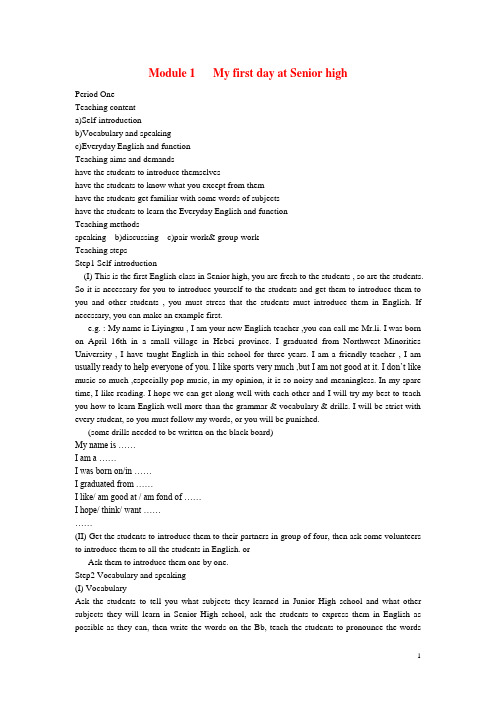
Module 1 My first day at Senior highPeriod OneTeaching contenta)Self-introductionb)Vocabulary and speakingc)Everyday English and functionTeaching aims and demandshave the students to introduce themselveshave the students to know what you except from themhave the students get familiar with some words of subjectshave the students to learn the Everyday English and functionTeaching methodsspeaking b)discussing c)pair-work& group-workTeaching stepsStep1 Self-introduction(I) This is the first English class in Senior high, you are fresh to the students , so are the students. So it is necessary for you to introduce yourself to the students and get them to introduce them to you and other students , you must stress that the students must introduce them in English. If necessary, you can make an example first.e.g. : My name is Liyingxu , I am your new English teacher ,you can call me Mr.li. I was born on April 16th in a small village in Hebei province. I graduated from Northwest Minorities University , I have taught English in this school for three years. I am a friendly teacher , I am usually ready to help everyone of you. I like sports very much ,but I am not good at it. I don’t like music so much ,especially pop music, in my opinion, it is so noisy and meaningless. In my spare time, I like reading. I hope we can get along well with each other and I will try my best to teach you how to learn English well more than the grammar & vocabulary & drills. I will be strict with every student, so you must follow my words, or you will be punished.(some drills needed to be written on the black board)My name is ……I am a ……I was born on/in ……I graduated from ……I like/ am good at / am fond of ……I hope/ think/ want …………(II) Get the students to introduce them to their partners in group of four, then ask some volunteers to introduce them to all the students in English. orAsk them to introduce them one by one.Step2 Vocabulary and speaking(I) VocabularyAsk the students to tell you what subjects they learned in Junior High school and what other subjects they will learn in Senior High school, ask the students to express them in English as possible as they can, then write the words on the Bb, teach the students to pronounce the wordsthey don’t know.e.g. : Chinese English Mathematics Physics Chemistry Biology Politics History Geography Arts Music IT (Information Technology) PE(Physical Education) GT(General Technology) Japanese Russian French(II)Dialogue (pair-work)T: How many subjects are science subjects?S: ……T: How many of them are languages?S: ……T: Which languages do you study at our school?S: .…..T: Which subjects do you like best? Why?S: ……Ask the students to imitate the dialogue to get which subject their partner like and why by using the following drills.Which subject do you like best? Why?Which subject do you like better between ...and …? Why?I like … because …I think … is important because …I would like to study/learn … because …In my opinion … is … so I …..Ask some of them to show their dialogues to the ss.Step 3 Everyday English and Function(I) T: After we have talked about the favorite subjects you like best, now lets turn to another part. Every day when we have a break between classes we may meet some old friends, you may talk about your classes , now please turn to P8 , let’s learn the dialogue in Everyday English and Function .Ask the students to listen to the tape ,then to read the dialogue in pairs. (explain some difficult words and teach ask them to pronounce them by looking up them in the dictionary)Ask the students to read and analyze these sentences.1 How are you doing?2 Oh really?3 Is that right?(II) Work in pairs. Make a conversation about one of your classes . Use the conversation in activity 1 to help. Ask some of them to report and act their dialogue out.Step4 SummaryThe teacher summary the whole class for the students and tell them what they should do to improve .HomeworkI Review the drills we learned in this class.II Preview Reading and vocabulary & Cultural corner.。
辽宁省沈阳市第二十一中学高中英语 ModuLe 5 A Lesson in a Lab 单元教案 外研版必修1
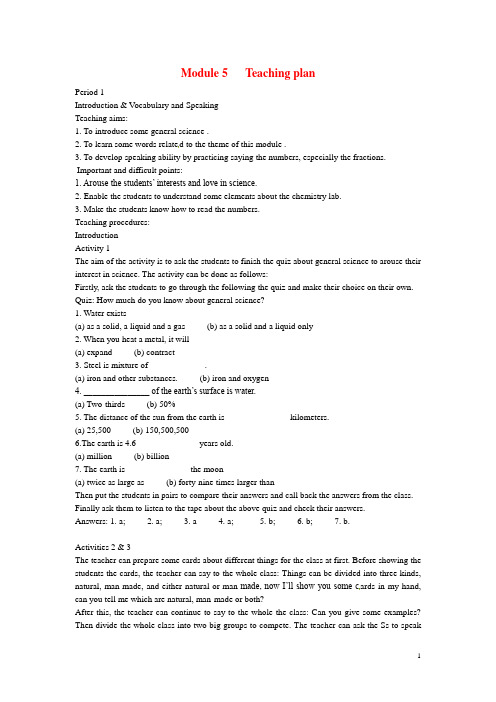
Module 5 Teaching planPeriod 1Introduction & Vocabulary and SpeakingTeaching aims:1. To introduce some general science .2. To learn some words relate d to the theme of this module .3. To develop speaking ability by practicing saying the numbers, especially the fractions.Important and difficult points:1. Arouse the students’ interests and love in science.2. Enable the students to understand some elements about the chemistry lab.3. Make the students know how to read the numbers.Teaching procedures:IntroductionActivity 1The aim of the activity is to ask the students to finish the quiz about general science to arouse their interest in science. The activity can be done as follows:Firstly, ask the students to go through the following the quiz and make their choice on their own. Quiz: How much do you know about general science?1. Water exists __________(a) as a solid, a liquid and a gas (b) as a solid and a liquid only2. When you heat a metal, it will ___________(a) expand (b) contract3. Steel is mixture of_____________.(a) iron and other substances. (b) iron and oxygen4. _______________ of the earth’s surface is water.(a) Two-thirds (b) 50%5. The distance of the sun from the earth is ______________ kilometers.(a) 25,500 (b) 150,500,5006.The earth is 4.6______________ years old.(a) million (b) billion7. The earth is ______________ the moon(a) twice as large as (b) forty-nine times larger thanThen put the students in pairs to compare their answers and call back the answers from the class. Finally ask them to listen to the tape about the above quiz and check their answers.Answers: 1. a; 2. a; 3. a 4. a; 5. b; 6. b; 7. b.Activities 2 & 3The teacher can prepare some cards about different things for the class at first. Before showing the students the cards, the teacher can say to the whole class: Things can be divided into three kinds, natural, man-made, and either natural or man-made, now I’ll show you some c ards in my hand, can you tell me which are natural, man-made or both?After this, the teacher can continue to say to the whole the class: Can you give some examples? Then divide the whole class into two big groups to compete. The teacher can ask the Ss to speakout as many examples as possible and write down the words in the table on the blackboard asNatural Eg: wood, ------Man-made Eg: glass, ------Either natural or man-made Eg: water, ------they can look up the word s to know what they mean. Of course, the above competition will continue, that is to say, at this moment, the teacher can ask the Ss to put the words in the box on Page 41 in their books in the above table.V ocabulary and SpeakingActivity 1The aim of the activity is to have the students know how to read the long numbers. So the activity can be done like this:Before dealing with the activity, the teacher had better build up a long number byhaving the students say an increasing sequence, eg:threethirty-threethree hundred and thirty-three3, 333 three thousand, three hundred and thirty-three33, 333 thirty-three thousand, three hundred and thirty-threeAt this time, most of the Ss will know the way of reading these long numbers: where to say “million”, “thousand”, and “hundred” . So in order to consolidate what they just learned, the teacher can practice saying the numbers at the top of Page 42 with the students to make sure the Ss have the correct intonation.Then ask the Ss to go through the rest of the numbers in Activity 1 and find the errors individually according to the directions.Finally the te acher calls back the answers from the class.Answers: 1)The word “thousand” is missing after “four hundred and seventy”;2)The word “one”(or “a”) is missing before “hundred million”.Activity 2Firstly, the teacher point at the fractions and say them in English. At the same time the teacher have the Ss repeat them after him or her.Then the teacher and the Ss make an analysis about the rules of reading fractions in English together.Finally the teacher ask the Ss to read the rest of the fractions in Activity 2 on Page 42 in their books in English on their own. If necessary, the teacher can write down the correct answers on the blackboard to check what they read.Answers: 1. two-fifths; 2. five-eighths; 3. nine-tenths 4.three-eighths;5.five-sixths.Activity 3The teacher should introduce the concept of percentage at first, and then the teacher write down some percentages on the blackboard and read them out in English.Eg: 35%→ thirty-five percent (or: 35 percent); 50 percent equals a half.Then have the S s practice reading aloud the following percentages: 40%; 55%; 85%.Finally have the Ss work in pairs to describe the fractions in Activity 2 as percentages in English . Answers: 1. A quarter is the same as 25%; 2.One third is the same as 33.33r%(thirty-three point three three recurring percent); 3.Four-fifths is the same as 80%; 4. One tenth is the same as 10%; 5. Three-quarters is the same as 75%; 6. One half is the same as 50%; 7. Two-thirds is the same as 66.66r%(sixty-six point six six recurring percent); 8. Two-fifths is the same as 40%; 9. Five-eighths is the same as 62.5%(sixty-two point five percent); 10. Nine-tenths is the same as 90%; 11. Three-eighths is the same as 37.5%(thirty-seven point five percent); 12.Five-sixths is the same as 83.33r%(eighty-three point three three recurring percent).Homework:1. Preview the reading part.Work in pairs to finish Activities 4& 5 on Page 43 .Periods 2 & 3Reading & VocabularyTeaching aims and demands:⒈To learn about some vocabulary and knowledge related to science and experiments⒉To know about some metals and get to know their main uses in our lives⒊To make the students know how to do a simple experiment and write the report about it in English⒋To deal with all the activities1-6 about passage A and passage B on page 44-45⒌To develop students’ expression ability as well as reading ability by practicing these two passages⒍To raise students’ interests in science and form the rigorous scientific attitude.Teaching key points:⒈To make the students understand and grasp the vocabulary and knowledge related to science and experiments⒉To enable the students to know how to read some passages about simple scientific experiments Teaching difficulties:To make students learn how to write an experiment report in EnglishTeaching methods:⒈Communicative Approach⒉Task-based Approach⒊Aural-oral Approach with the help of the multi-media computer and the recorderTeaching aids:Multi-media computer; Software; PowerPoint; RecorderTeaching procedures:Step 1: Lead-inAt first show the students the picture of a lab with the help of computerThen design the following questions and ask the students to discuss them in groups:Are you interested in doing scientific experiments?Suppose you want to do a chemical experiment about some metals, do you think it is necessary to know about how they react with other substances?In order to carry out an experiment successfully, what should you prepare for it?This step is to warm up the students and raise their interests to speak English in class. Because all these questions are very close to the students’ daily life and studyingStep 2:Pre-readingTeacher: Since you are interested in doin g scientific experiments, now let’s get to know some vocabulary and knowledge related to science and experiments.At the same time I can type out some pictures about some metals on the screen with the help of the computer as follows:⑴potassium(钾) ⑵sodium(钠) ⑶calcium(钙) ⑷magnesium(镁)⑸aluminium(铝) ⑹zinc(锌) ⑺iron(铁) ⑻copper(铜)As I type out each of the above pictures, I can ask the students like this: What’s this? And what can it be used for?At this moment the students’ interests are probably approaching a climax. So I further ask them like this: Do you want to know more about these metals? And do you know how we can use these metals better? Well, this is what we’ll study very soon.Th is step is employed to create a language environment for students’ communication and arouse their interests in reading passage A and passage B on page 44-45Step 3: ReadingPassage AT: Well, let’s read through passage A with the tape of it very qui ckly to try to catch its main idea. Then finish Activity 2 on page 44 and give your reasons.Next, ask the Ss to read passage A very carefully to find out the answers in Activity 3 on page 44. Finish this activity by multi-media computer. It can be designed as follows:Which of the metals in the table reacts the most with oxygen and water?Potassium, calcium and sodium.What happens when you heat calcium in oxygen?It burns to form an oxide.Which metals react with steam?Magnesium, aluminium and zinc.Does iron have a slow or fast reaction with steam?It has a slow reaction.Does copper react with water?No, it doesn’t.Passage BT: Well, from passage A we can see how interesting the experiment about the reaction of metals is! But do you know how we can carry out a chemical experiment in a lab successfully? And what is the correct order to describe a scientific experiment?Ask the Ss to look at Activity 1 on page 44 and give them about 2 minutes to discuss it. Then collect the answers from them. At the same time type out the correct answer on the screen with the computer as follows:aim method result conclusionT: Now, let’s come to see “ A simple scientific experiment”!Then play the tape of passage B for the students and ask them to read the passage with the tape quickly and finish Activity 4 on page 44.In order to lead the students to read the text very carefully, the following task-based questions can be signed to ask them to answer:⑴Can you guess the meaning of the word “apparatus” through the context? Have you known all of the apparatuses of this experiment?⑵In the second part of the experiment, why must you boil the water? And then why do you add some oil to the water?For Question 1, some students maybe feel strange to some apparatuses. If so , the following pictures can be typed out with the help of computer to help Ss to know about:Then in order to make the Ss consolidate what they read in passage B and check if they have understood the experiment very well, Activity 5 on page 46 can be typed out on the screen with the help of computer as a task-based activity 。
辽宁省沈阳市第二十一中学高中英语Module1MyFirstDayatSeniorHigh1教案外研版必修1
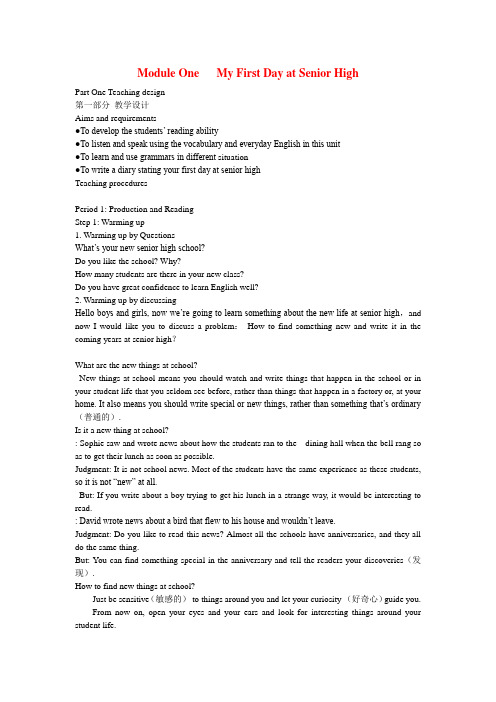
Module One My First Day at Senior HighPart One Teaching design第一部分教学设计Aims and requirements●To develop the students’ reading ability●To listen and speak using the vocabulary and everyday English in this unit●To learn and use grammars in different situation●To write a diary stating your first day at senior highTeaching proceduresPeriod 1: Production and ReadingStep 1: Warming up1. Warming up by QuestionsWhat’s your new senior high school?Do you like the school? Why?How many students are there in your new class?Do you have great confidence to learn English well?2. Warming up by discussingHello boys and girls, now we’re going to learn something about the new life at senior high,and now I would like you to discuss a problem:How to find something new and write it in the coming years at senior high?What are the new things at school?New things at school means you should watch and write things that happen in the school or in your student life that you seldom see before, rather than things that happen in a factory or, at your home. It also means you should write special or new things, rather than something that’s ordinary (普通的).Is it a new thing at school?: Sophie saw and wrote news about how the students ran to the dining hall when the bell rang so as to get their lunch as soon as possible.Judgment: It is not school news. Most of the students have the same experience as these students, so it is not “new” at all.But: If you write about a boy trying to get his lunch in a strange way, it would be interesting to read.: David wrote news about a bird that flew to his house and wouldn’t leave.Judgment: Do you like to read this news? Almost all the schools have anniversaries, and they all do the same thing.But: You can find something special in the anniversary and tell the readers your discoveries(发现).How to find new things at school?Just be sensitive(敏感的)to things around you and let your curiosity (好奇心)guide you.From now on, open your eyes and your ears and look for interesting things around your student life.3. Warming up by studying vocabularyTurn to page 113,and study the vocabulary list for Unit one, paying attention to the relationship between the spelling and the pronunciation.Step 2: Pre-reading1. ImaginingWell, we are in a new class at senior school, there are new students, new teacher, new classroom and newlessons around us, imagine how are all of them getting on in the coming years.2. Introduce some new wordsShow the following new words from the diary, the text, and ask the students to read them all together twice each word while correcting their pronunciation.province information comprehension instruction method brilliant attitude behavior description amazed embarrassed enthusiasticSpelling practiceOk, we are to have a spelling quiz. Read every sentence and write out a word in the box above, using a proper form of the words.We may get much more i_______ from the Internet nowadays.I felt so a______ when I heard the news of the accident which happened yesterday.What’s your a______ to studying English this new term?They have got many m______ to solve this problem, don’t worry.Do you feel e______ when your friend refuses to lend you some money?I know little about the new machine, have you got any i______ when you buy it?( Keys: information, amazed, attitude, methods, embarrassed, instructions )Step 3: ReadingLeading-inAfter discussing something about our class, our new school, we restudied some new words in this unit, maybe we think a new stage for a person, including a new school for a student, is not only fresh but also full of encouragement and challenge. I think, as long as you value the chance and work hard, success must belong to you. Now, l et’s learn something about Li Kang’s sense at his first day at senior high. After reading, answer the following questions.Which city does Li Kang come from?What about his classrooms? What are there in the classrooms?Is his English teacher excellent? Why?What does Ms Shen want to do to help her students in English learning?How many students are there in the class?Fast reading for the general ideaKnowing Li Kang’s opinions about his new school, decide which of the following is the best.Li just likes his English teacher.Li not only likes his former school but his present one.Li describes his impression about his new class and English teacher.Li mainly introduced himself to his classmates.( Key: C )Listening to the tape of the text and try to find which of the following words appear in the story.academic enthusiastic diploma amazing technology methodscreen move friendly teenager handwriting systemjunior high school devoted myself looking forward to doing in time (Keys: enthusiastic, amazing, method, screen, friendly, handwriting, junior high school, looking forward to doing )Detailed reading for informationRead the following sentences and decide whether they are true (T) or false (F) according the text. Li Kang lives in our capital, Beijing.It is his first day at Junior High school.Li Kang knows why his new school is good.Ms. Shen is very enthusiastic woman to her students.Li Kang likes Ms. Shen’s attitude, but the others don’t.( Keys: 1 F 2 F 3 T 4 T 5 F )Step 4: Reading practiceRead the following passage within 5 minutes and make a better choice to each problem.One of the schools that offered me a full ride had an informal dinner one night in the spring. Considering my parents' financial difficulties, I decided to drive the 45 minutes and attend. At first, all I had planned to do was smile politely, eat free food, and listen quietly. But I surprised myself. At dinner the president of the university talked about the wonderful activities on campus including guest lectures and social gatherings. He also made it perfectly clear that free food would be offered at all future events. He continued with explanations of professors, he spoke, I began to realize that this school, though not as good as my first choice, might be the best one for me. It seemed meeting with many great programs. It seemed challenging yet caring.As the president ended his speech, we clapped politely and pushed back our chairs. As I walked out of that door, a feeling of comfort washed over me. Looking at the campus that night, I realized that I would be spending the next four years right there.In all honesty, my university is not as well-known as my "dream" university. However, it turned out to be the right choice of schools for me.1. How did the author feel when he started to read the letter?A. He was full of joy.B. He was lost in his dreamC. He was worried about the moneyD. He was uncertain which school to go to2. We can learn from the passage that the parents were ____.A. honestB. strictC. supportiveD. decisive3. In paragraph 5, "offered me a full ride" can be replaced by "____."A. would pay for transport to the schoolB. would show me around the campusC. would offer free meals at all eventsD. would charge me nothing for tuition4. What does the author mainly want to say?A. You second-choice college may actually be your best fit.B. You should consider comfort in your choice of schoolsC. You should try your best to attend your dream schoolD. Your choice of schools should be based on their fame.(Keys: 1.D 2.C 3.D 4.A)Step5:HomeworkTry to describe your classroom and your English teacher orally. Repeat the text.Learn the new words again using the dictionary if necessary.。
辽宁沈阳二十一中英语必修1外研版Module 5-1课件(34张)
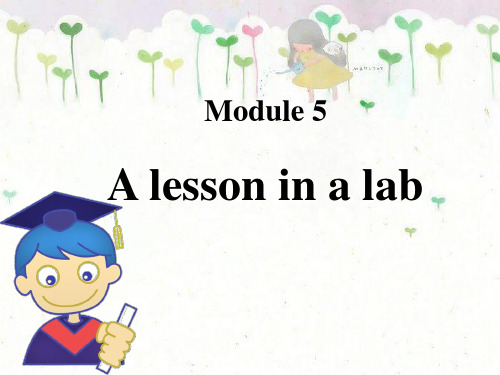
2. “比较级 + and + 比较级”结构(两 个同义形容词的比较级),表示“越 来越……”的意思。
Winter is coming. It’s getting colder and colder.
The girl becomes more and more beautiful.
Module 5
A lesson in a lab
形容词和副词的比较级
形容词的比较级和最高级的基本 用法在初中阶段已经学习过,这 里只作简单复习。
情况 变化方法 原级
一般情况 加er, est
short
以字母e结 尾
重读闭音 节、末尾 只有一个 辅音字母
加r, st
双写加er, est
以辅音字 变y为i加er,
C: Winter in Harbin is four times the coldness of that in Beijing.
Diameter直径 Earth=1 Jupiter=11
(big/size)
A: Jupiter is eleven times as big as the earth .
Our school is three times the size of yours.
注意: 请注意以下两个例句中倍数的翻译方法。
This room is three times as large as that one.
这个房间有那个房间三个大。
This room is three times larger than that one.
倍数 + as + 形容词 + as …
The brown house’s windows are twice as wide as those of the white house.
辽宁省沈阳市第二十一中学高中英语 Module 1 My First Day at SeniorPeriod 1教案 外研版必修1
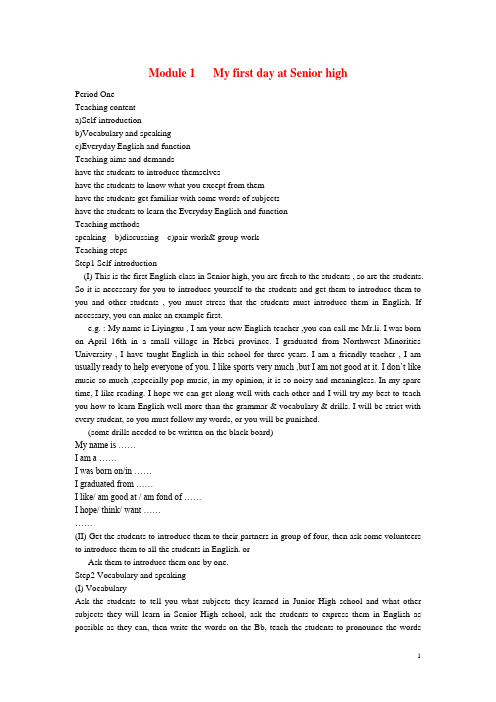
Module 1 My first day at Senior highPeriod OneTeaching contenta)Self-introductionb)Vocabulary and speakingc)Everyday English and functionTeaching aims and demandshave the students to introduce themselveshave the students to know what you except from themhave the students get familiar with some words of subjectshave the students to learn the Everyday English and functionTeaching methodsspeaking b)discussing c)pair-work& group-workTeaching stepsStep1 Self-introduction(I) This is the first English class in Senior high, you are fresh to the students , so are the students. So it is necessary for you to introduce yourself to the students and get them to introduce them to you and other students , you must stress that the students must introduce them in English. If necessary, you can make an example first.e.g. : My name is Liyingxu , I am your new English teacher ,you can call me Mr.li. I was born on April 16th in a small village in Hebei province. I graduated from Northwest Minorities University , I have taught English in this school for three years. I am a friendly teacher , I am usually ready to help everyone of you. I like sports very much ,but I am not good at it. I don’t like music so much ,especially pop music, in my opinion, it is so noisy and meaningless. In my spare time, I like reading. I hope we can get along well with each other and I will try my best to teach you how to learn English well more than the grammar & vocabulary & drills. I will be strict with every student, so you must follow my words, or you will be punished.(some drills needed to be written on the black board)My name is ……I am a ……I was born on/in ……I graduated from ……I like/ am good at / am fond of ……I hope/ think/ want …………(II) Get the students to introduce them to their partners in group of four, then ask some volunteers to introduce them to all the students in English. orAsk them to introduce them one by one.Step2 Vocabulary and speaking(I) VocabularyAsk the students to tell you what subjects they learned in Junior High school and what other subjects they will learn in Senior High school, ask the students to express them in English as possible as they can, then write the words on the Bb, teach the students to pronounce the wordsthey don’t know.e.g. : Chinese English Mathematics Physics Chemistry Biology Politics History Geography Arts Music IT (Information Technology) PE(Physical Education) GT(General Technology) Japanese Russian French(II)Dialogue (pair-work)T: How many subjects are science subjects?S: ……T: How many of them are languages?S: ……T: Which languages do you study at our school?S: .…..T: Which subjects do you like best? Why?S: ……Ask the students to imitate the dialogue to get which subject their partner like and why by using the following drills.Which subject do you like best? Why?Which subject do you like better between ...and …? Why?I like … because …I think … is important because …I would like to study/learn … because …In my opinion … is … so I …..Ask some of them to show their dialogues to the ss.Step 3 Everyday English and Function(I) T: After we have talked about the favorite subjects you like best, now lets turn to another part. Every day when we have a break between classes we may meet some old friends, you may talk about your classes , now please turn to P8 , let’s learn the dialogue in Everyday English and Function .Ask the students to listen to the tape ,then to read the dialogue in pairs. (explain some difficult words and teach ask them to pronounce them by looking up them in the dictionary)Ask the students to read and analyze these sentences.1 How are you doing?2 Oh really?3 Is that right?(II) Work in pairs. Make a conversation about one of your classes . Use the conversation in activity 1 to help. Ask some of them to report and act their dialogue out.Step4 SummaryThe teacher summary the whole class for the students and tell them what they should do to improve .HomeworkI Review the drills we learned in this class.II Preview Reading and vocabulary & Cultural corner.。
辽宁省沈阳市第二十一中学高中英语 Module 1 My First Day at SeniorPeriod 5教案 外研版必修1
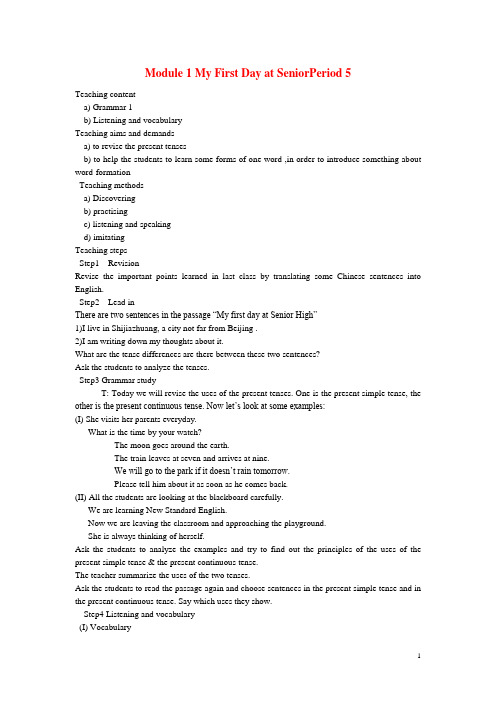
Module 1 My First Day at SeniorPeriod 5Teaching contenta) Grammar 1b) Listening and vocabularyTeaching aims and demandsa) to revise the present tensesb) to help the students to learn some forms of one word ,in order to introduce something about word-formationTeaching methodsa) Discoveringb) practisingc) listening and speakingd) imitatingTeaching stepsStep1 RevisionRevise the important points learned in last class by translating some Chinese sentences into English.Step2 Lead inThere are two sentences in the passage “My first day at Senior High”1)I live in Shijiazhuang, a city not far from Beijing .2)I am writing down my thoughts about it.What are the tense differences are there between these two sentences?Ask the students to analyze the tenses.Step3 Grammar studyT: Today we will revise the uses of the present tenses. One is the present simple tense, the other is the present continuous tense. Now let’s look at some examples:(I) She visits her parents everyday.What is the time by your watch?The moon goes around the earth.The train leaves at seven and arrives at nine.We will go to the park if it doesn’t rain tomorrow.Please tell him about it as soon as he comes back.(II) All the students are looking at the blackboard carefully.We are learning New Standard English.Now we are leaving the classroom and approaching the playground.She is always thinking of herself.Ask the students to analyze the examples and try to find out the principles of the uses of the present simple tense & the present continuous tense.The teacher summarize the uses of the two tenses.Ask the students to read the passage again and choose sentences in the present simple tense and in the present continuous tense. Say which uses they show.Step4 Listening and vocabulary(I) VocabularyT: We have learned something about grammar ,now let’s revise some old words learned in Junior High English.Explain Explanation Pronounce Pronunciation Encourage Encouragement Understand Understanding misunderstandingNow finish the chart with the words in the box.Complete these sentences with a suitable form of each word in the box., then check the answers with the students.Ask the students to read the sentences in activity 2 again and answer the questions in activity 3. (II) ListeningT: I really don’t know if your answers are correct or not, so let’s listen to the conversation to check your answers ,and you must try your best to get the general idea of the conversation.Play the tape for the students, then ask the students to tell you what they have learned from the conversation.T: Yes , most of you have known something about the conversation ,but you didn’t get the details clearly. I will play the tape for you after you read the questions in activity 4. Now please read the questions quickly.Play the tape for the students and ask them to make some notes which will help them to answer the questions by write down some key words or phrases.Check answers with the students and write down the difficult points.Play the tape for the third time , stop when and where necessary, repeat the difficult parts.Step 4 SummaryThe teacher summarize the class by revising the word-formation. And ask the students to read the sentences in activity2 in Listening and vocabulary.HomeworkI Remember the words and the sentences in Listening and vocabulary.II Try to find some other principles of word-formation.III Preview Grammar 2 , Pronunciation &Writing. Speaking。
辽宁省沈阳市第二十一中学高中英语 Module 1 My First Day at SeniorPeriod 5教案 外研版必修1 (2)
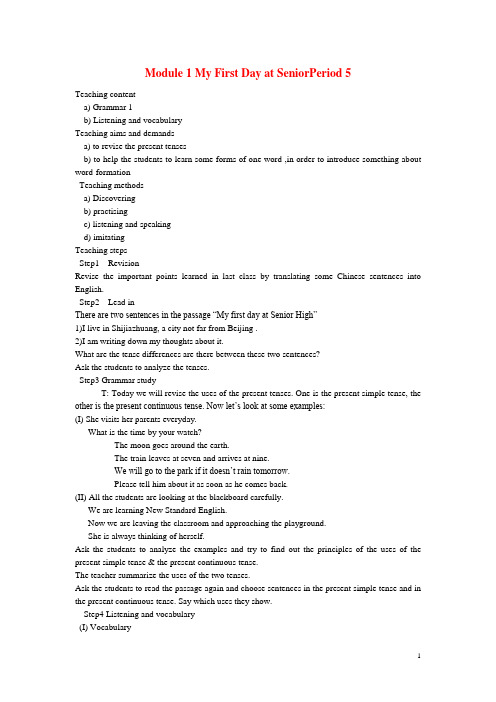
Module 1 My First Day at SeniorPeriod 5Teaching contenta) Grammar 1b) Listening and vocabularyTeaching aims and demandsa) to revise the present tensesb) to help the students to learn some forms of one word ,in order to introduce something about word-formationTeaching methodsa) Discoveringb) practisingc) listening and speakingd) imitatingTeaching stepsStep1 RevisionRevise the important points learned in last class by translating some Chinese sentences into English.Step2 Lead inThere are two sentences in the passage “My first day at Senior High”1)I live in Shijiazhuang, a city not far from Beijing .2)I am writing down my thoughts about it.What are the tense differences are there between these two sentences?Ask the students to analyze the tenses.Step3 Grammar studyT: Today we will revise the uses of the present tenses. One is the present simple tense, the other is the present continuous tense. Now let’s look at some examples:(I) She visits her parents everyday.What is the time by your watch?The moon goes around the earth.The train leaves at seven and arrives at nine.We will go to the park if it doesn’t rain tomorrow.Please tell him about it as soon as he comes back.(II) All the students are looking at the blackboard carefully.We are learning New Standard English.Now we are leaving the classroom and approaching the playground.She is always thinking of herself.Ask the students to analyze the examples and try to find out the principles of the uses of the present simple tense & the present continuous tense.The teacher summarize the uses of the two tenses.Ask the students to read the passage again and choose sentences in the present simple tense and in the present continuous tense. Say which uses they show.Step4 Listening and vocabulary(I) VocabularyT: We have learned something about grammar ,now let’s revise some old words learned in Junior High English.Explain Explanation Pronounce Pronunciation Encourage Encouragement Understand Understanding misunderstandingNow finish the chart with the words in the box.Complete these sentences with a suitable form of each word in the box., then check the answers with the students.Ask the students to read the sentences in activity 2 again and answer the questions in activity 3. (II) ListeningT: I really don’t know if your answers are correct or not, so let’s listen to the conversation to check your answers ,and you must try your best to get the general idea of the conversation.Play the tape for the students, then ask the students to tell you what they have learned from the conversation.T: Yes , most of you have known something about the conversation ,but you didn’t get the details clearly. I will play the tape for you after you read the questions in activity 4. Now please read the questions quickly.Play the tape for the students and ask them to make some notes which will help them to answer the questions by write down some key words or phrases.Check answers with the students and write down the difficult points.Play the tape for the third time , stop when and where necessary, repeat the difficult parts.Step 4 SummaryThe teacher summarize the class by revising the word-formation. And ask the students to read the sentences in activity2 in Listening and vocabulary.HomeworkI Remember the words and the sentences in Listening and vocabulary.II Try to find some other principles of word-formation.III Preview Grammar 2 , Pronunciation &Writing. Speaking。
高中英语 Module5 A Lesson in a Lab period 外研版必修1 教案
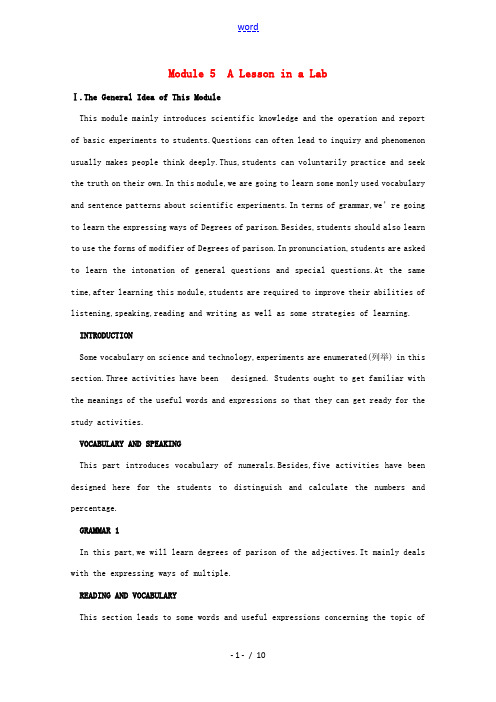
Module 5 A Lesson in a LabⅠ.The General Idea of This ModuleThis module mainly introduces scientific knowledge and the operation and report of basic experiments to students.Questions can often lead to inquiry and phenomenon usually makes people think deeply.Thus,students can voluntarily practice and seek the truth on their own.In this module,we are going to learn some monly used vocabulary and sentence patterns about scientific experiments.In terms of grammar,we’re going to learn the expressing ways of Degrees of parison.Besides,students should also learn to use the forms of modifier of Degrees of parison.In pronunciation,students are asked to learn the intonation of general questions and special questions.At the same time,after learning this module,students are required to improve their abilities of listening,speaking,reading and writing as well as some strategies of learning.INTRODUCTIONSome vocabulary on science and technology,experiments are enumerated(列举) in this section.Three activities have been designed. Students ought to get familiar with the meanings of the useful words and expressions so that they can get ready for the study activities.VOCABULARY AND SPEAKINGThis part introduces vocabulary of numerals.Besides,five activities have been designed here for the students to distinguish and calculate the numbers and percentage.GRAMMAR 1In this part,we will learn degrees of parison of the adjectives.It mainly deals with the expressing ways of multiple.READING AND VOCABULARYThis section leads to some words and useful expressions concerning the topic ofthis module.It also introduces oxide reaction of metals.The exercises designed according to the reading text enable the students to learn to use the relevant vocabulary by doing the exercises.VOCABULARYThis section supplies vocabulary on experimental apparatus and gives us the reading method of fractions.It also supplies us some relevant activities.LISTENING AND WRITINGThe listening material is a dialogue of teachers and students who are doing an experiment.It gives us the activity on relevant experiment as well.GRAMMAR 2This section mainly introduces three kinds of usage of degrees of parison of the adjectives.PRONUNCIATIONIn this part,the students are required to master the intonation of general questions and special questions.EVERYDAY ENGLISHIn this part,the students shall learn several useful expressions of daily English.That is:“Where do we go from here?”“Keep the noise down.”“You’ve got it.”“It’s your turn.”“Go ahead!”FUNCTIONIn writing,the students are asked to grasp the use of first,next,after that,lastly and so on in a paragraph.They are also required to learn the usage of ma.CULTURAL CORNERThe students must learn the teaching conditions of senior high school education of Canada by reading this passage.TASKIt requires students to work in pairs.Furthermore,the students are asked to writean experimental report by recalling the experiments carried out in class and going over the content of reading.MODULE FILEThis section summarizes the words and expressions,grammar,pronunciation and everyday Egnlish learnt in this module.Ⅱ.Three-Dimensional Goals1.Knowledge and skills(1)Be able to master the key vocabulary and read the text fluently.Get to know something about science and technology,experimental reports.(2)The students are required to understand and master the usage of tractions and degrees of parison of adverbs.2.Process and methods(1)Learn independently,under the teacher’s guidance.Try to get to know knowledgeconcerning experiments on science and technology.(2)Inquiry and activity.Students are required to understand its importance of scientific knowledge.The students will be aroused the enthusiasm for observing and analyzing problems.3.Emotion and valuesThe materials in this part can help students change their attitude towards study and arouse their interest of learning so that they can form their own goals of study. Ⅲ.Teaching Important PointsStudents should get to know some scientific knowledge and draw a conclusion by doing some experiments.Master relevant vocabulary and phrases and improve the students’ abilities of listening,speaking,reading and writing.Ⅳ.Teaching Difficult PointHow to improve the students’ ability of writing effectively.Ⅴ.Preparation of Teaching Aidsa tape recorder,multimedia,a puter and a slide projectorⅥ.Teaching Timefive periodsThe first period:Introduction,Vocabulary and SpeakingThe second and the third period:Reading and VocabularyThe fourth period:Vocabulary,Listening and Writing,Grammar 1-2The fifth period:Pronunciation Everyday English,Function and Cultural CornerThe First PeriodThe General Idea of This PeriodIn this period,we are going to learn to say some large numbers quickly and correctly. And we will learn to use some new words.Teaching Aims1.Learn and master the following:Learn the meaning of the following words:liquid,expand,contract,substance,mixture,oxygen,electricity.Learn to say the large numbers in English.2.Develop the students’ speaking ability by listening and speaking.Teaching Important Points1.Train the students’ abilities of listening and speaking.2.Enable the Ss to recognize the numbers,fractions and percentages.Teaching Difficult PointHow to improve the students’ speaking ability.Teaching MethodsIndividual and pair work.Teaching Aids1.a puter2.a projector3.the blackboardTeaching ProceduresStep 1 Greetings and Lead-inT:Hello,everyone.Ss:Hello,Mr Li.T:Sit down,please. Now in this unit we are going to learn something about general science and learn how to express the numbers. First of all,let’s learn the new words. (Show the new words on the screen.)liquid 液体expand 膨胀contract 收缩substance 物质mixture 混合物oxygen 氧气electricity 电T:OK. Please read the new words and find the Chinese meaning for each worD.(The Ss read and look up the words in the vocabulary individually.Teacher makes sure the Ss know the new words. Read the words after you.) Step 2 Choose the correct answers to the quiz.Teacher asks the Ss to look through Part one and judge which statements are true. The Ss read and tick the possible right sentences.T:Now listen and check your answers.The Ss check the answers in pairs.1.a2.a3.a4.a5.b6.b7.bT:Now listen again and check your answers.Step 3 PracticeT:Put the words in pairs or groups individually.(The Ss work on their own.)T:pare the answers in pairs.1.air—oxygen2.contract—expand3.earth—sun—moon4.gas—liquid—solidStep 4 PracticeTeacher shows the words on the screen. Have the class repeat them.electricity iron metal steel air glassT:Can you find these things in our classroom?(Further questions for them to answer)Which of the above are natural?Which are man-made?Which can be both?T:Work in pairs or groups.(Call back the answers from the class.)1.Electricity,iron,some metals and air are natural.2.Steel,some metals and glass are man-made.3.Electricity and some metals (alloys for example) can be man-made and naturally.Step 5 Vocabulary and speaking1.Look at the numbers.(Show these numbers on the screen. Ask them to say the numbers. The English expression will be given when a student makes the answer.)76 seventy-six876 eight hundred and seventy-six2876 two thousand,eight hundred and seventy-six32 876 thirty-two thousand,eight hundred and seventy-six432 876 four hundred and thirty-two thousand,eight hundred and seventy-six2.Look and learn SB P42 Part 1By this time,the Ss should kn ow the meaning of “million”.T:Read the numbers. And find the two mistakes.This is a good time the Ss learn how to say the large numbers. The teacher walks aroundthe class and offers help when necessary.S:I’ve found the errors. The first two numbers are misread.T:You’re right. But how can you say the numbers?S:The first one should be fifty-two million,four hundred and seventy thousand,three hundred and eighty-three.T:Great! What about the second?S:It’s one hundred million.T:Good job!3.Look and sayLook at the following big numbers and say them in English quickly.55 555655 5557 555 50587 555 500987 555 5001 000 000 0004.Listen and writeT:Listen to the following numbers in English and write them down.three thousand,five hundred and forty-sixthirty-three thousand,seven hundred and ninety-sixfive hundred and twenty-two thousand,four hundred and eighty-fivethree million,two hundred and thirty-five thousandThe Ss write in the Arab letter.The teacher collects some of their work and shows it on the real object objector. 5.Look at these fractions SB,P42 Part 2T:Now please say these fractions in English.S:Two fifth.T:Is it right?S:No,it’s two fifths.T:Good! Next?S:Five eighths.S:Nine tenths.S:Three eighths.S:Five sixths.T:Who can describe the fractions in Activity 2 as percentages?S:I’ll try. One third is the same as 33.33%.S:Four-fifths is the same as 80%.S:One-tenth is the same as 10%.S:Three-quarters is the same as 75%.S:One half is the same as 50%.S:Two-thirds is the same as 66.66%.S:Two-fifths is the same as 40%.S:Five-eighths is the same as 62.5%.S:Nine-tenths is the same as 90%.S:Three-eighths is the same as 37.5%.S:Five-sixths is the same as 83.33%.T:Good! Your mathematics is excellent!6.PracticeT:Let’s turn to P43,Part 4Read these questions aloud and say the numbers.(Put the Ss into pairs to take turns asking and answering the questions. Circulate,monitor and help where necessary. Call back the answers from the class.)(1)3 000 000 (2)48 046 000(3)50 000 000(4)265 693 096(5)750 375 000(6)80 000 000Step 6 PracticeT:Work in pairs. Give your partner five sums. Use numbers over a million. Your partner must find the answers. Work out the answers and then say them in words.Step 7 Assignment1.Master the new words we have learned in this class.2.Work in pairs. Look,listen,speak and write the larger numbers,fractions and percentages.Step 8 The design of the writing on the blackboardModule 5 A Lesson in a LabTheFirstPeriodliquid55 555expand655 555contract7 555 505substance87 555 500mixture987 555 500oxygen1 000 000 000electricityStep 9 Activity and InquirySteps Students’ Acting Teacher’s Organizing1 The students are asked to use a mixture ofpercentages,additions and fractions,as in the previous activity.Then work outthe questions on their own first,but leavethe answers off the paper they write thequestions on. Ask the students to work out the answers independently.Ask the students to carry out the activity seriously.。
外研版高中英语必修一Module 5A Lesson in a Lablistening, speaking and writing教案1
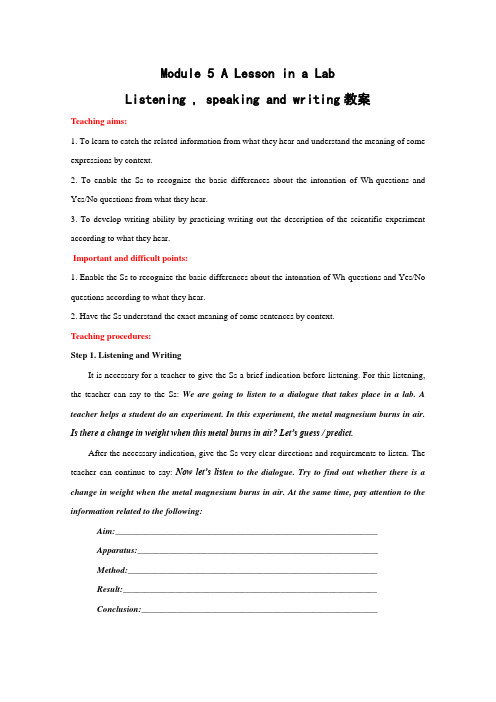
Module 5 A Lesson in a LabListening , speaking and writing教案Teaching aims:1. To learn to catch the related information from what they hear and understand the meaning of some expressions by context.2. To enable the Ss to recognize the basic differences about the intonation of Wh-questions and Yes/No questions from what they hear.3. To develop writing ability by practicing writing out the description of the scientific experiment according to what they hear.Important and difficult points:1. Enable the Ss to recognize the basic differences about the intonation of Wh-questions and Yes/No questions according to what they hear.2. Have the Ss understand the exact meaning of some sentences by context.Teaching procedures:Step 1. Listening and WritingIt is necessary for a teacher to give the Ss a brief indication before listening. For this listening, the teacher can say to the Ss:We are going to listen to a dialogue that takes place in a lab. A teacher helps a student do an experiment. In this experiment, the metal magnesium burns in air. Is there a change in weight when this metal burns in air? Let’s guess / predict.After the necessary indication, give the Ss very clear directions and requirements to listen. The teacher can continue to say: Now let’s list en to the dialogue. Try to find out whether there is a change in weight when the metal magnesium burns in air. At the same time, pay attention to the information related to the following:Aim:____________________________________________________________Apparatus:_______________________________________________________Method:_________________________________________________________Result:__________________________________________________________Conclusion:______________________________________________________Then begin to play the tape once and ask answers from the whole class. And then ask the Ss to finish Activity 2 on Page 47.Play the recording again and ask the Ss to complete the above description on their own, and then to check their answers in pairs. Before replaying the recording, of course, had better remind the Ss how they usually write up science experiments, that is, completing the description involves some careful reading for specific information and reorganizing the information.Answers:Aim:to find out if there’s a change in weight when magnesium burns in air.Apparatus: Magnesium, Bunsen burner, a balance, a crucible.Method: First, put the magnesium in the crucible. Then put the crucible on the balance and weigh it. Next, heat the magnesium. Light the Bunsen burner and hold the crucible over it. Finally, weigh the magnesium again.Result: It weighs a little more than before.Conclusion: There is a change in weight when magnesium burns in air.Step 2. Everyday EnglishFirstly, ask the Ss to go through the everyday English on Page 48 and choose the correct meanings individually.Then tell the Ss where these everyday English sentences from——they are from the above listening. Now replay the recording, ask the Ss to check what they chose.Answers: 1) a; 2) b; 3) a; 4) b; 5) a.Step 3. PronunciationAt first,organize the Ss to listen to the recording, at the same time, give them the direction to listen and ask them to pay attention to the intonation of Wh-questions and Yes/No questions.Then play the tape for the class and ask them againAfter that, help the Ss to summarize the basic intonation of Wh-questions and Yes/No questions.Answers: Wh-questions often fall at the end. Yes/No questions often rise.And then play the tape again and ask the Ss to imitate it.Finally, give the Ss more sentences to practice.Step 4. HomeworkRevise the whole Module 5 and begin to preview Module 6.。
外研版高中英语必修1 module 5a lesson in a labperio
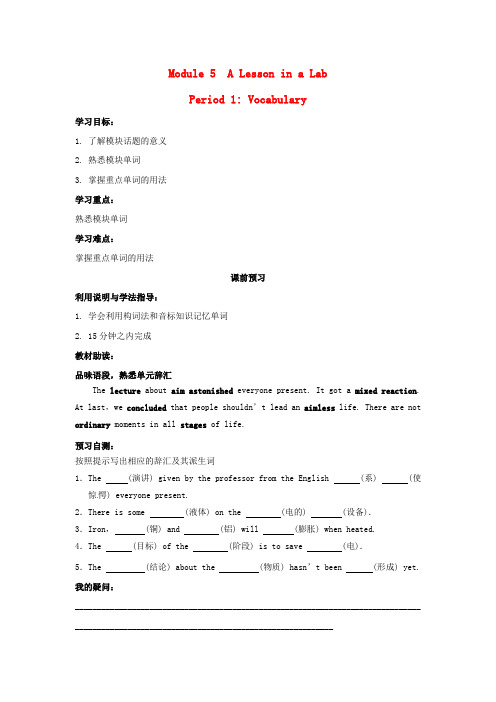
Module 5 A Lesson in a LabPeriod 1: Vocabulary学习目标:1. 了解模块话题的意义2. 熟悉模块单词3. 掌握重点单词的用法学习重点:熟悉模块单词学习难点:掌握重点单词的用法课前预习利用说明与学法指导:1. 学会利用构词法和音标知识记忆单词2. 15分钟之内完成教材助读:品味语段,熟悉单元辞汇The lecture about aim astonished everyone present. It got a mixed reaction. At last,we concluded that people shouldn’t lead an aimless life. There are not ordinary moments in all stages of life.预习自测:按照提示写出相应的辞汇及其派生词1.The (演讲) given by the professor from the English (系) (使惊愕) everyone present.2.There is some (液体) on the (电的) (设备).3.Iron, (铜) and (铝) will (膨胀) when heated.4.The (目标) of the (阶段) is to save (电).5.The (结论) about the (物质) hasn’t been (形成) yet.我的疑问:_______________________________________________________________________________ ___________________________________________________________课内探讨质疑探讨:1 equipment n.[U]装备;设备学情诊断All classes of this school are ________with modern________.A.equipped;equipment B.equipped;equipmentsC.equippin g;equipments D.equipping;equipment归纳拓展equip v.配备;装备;使有所预备;使有能力equip...with...给……配备/装备……;使……具有……be equipped with装备有……2 react双语释义vi.作出反映;反映(response);起化学反映学情诊断The rise of the charges for water and electricity will react ________ living expenses.A.by B.on C.to D.with归纳拓展react to对……作出反映/评价react with与……起反映reaction n.反映3 balance n.均衡,平衡;天平,秤;vt.使保持平衡;权衡学情诊断You are working too ’d better keep a________between work and relaxation. A.promi se B.leadC.balance D.diary归纳拓展keep/lose one’s balance维持/失去平衡out of balance失去平衡balance...against衡量,比较balance A with/and B同样重视balanced adj.平稳的,安宁的,和谐的4 used to do sth.过去常常做某事学情诊断I’m surprised to see you ______,I remember.A.are not used to B.were not used toC.didn’t use to D.used not归纳拓展be/get/become used to doing sth.=be accustomed to doing sth.适应于做……be used to do sth.被用来做某事be used as被看成……来用be used for被用来做……易错提示used to do表过去常常做某事,此刻不如此子了;would表示过去的一种适应。
- 1、下载文档前请自行甄别文档内容的完整性,平台不提供额外的编辑、内容补充、找答案等附加服务。
- 2、"仅部分预览"的文档,不可在线预览部分如存在完整性等问题,可反馈申请退款(可完整预览的文档不适用该条件!)。
- 3、如文档侵犯您的权益,请联系客服反馈,我们会尽快为您处理(人工客服工作时间:9:00-18:30)。
Module 5 A lesson in labTeaching Design第一部分教学设计Teaching aims and requirements of the unitTo learn about some vocabulary and knowledge related to science and experimentsTo know about some metals and get to know their main uses in our livesTo make the students know how to do a simple experiment and write the report about it in English To deal with all the activities 1-6 about passage A and passage B on page 44-45To develop students’ expression ability as well as reading ability by practicing these tw o passages To raise students’ interests in science and form the rigorous scientific attitude.Teaching pointHow iron reacts with air and with water?Teaching proceduresPeriod Two: Grammar and usageStep 1: General introduction1. Structures of comparison structures ( 形容词或副词各级别句式)1). as + adj./ adv. + as.The layout of Class One’s wall newspaper is as beautiful as that of Class Three’s.as + adj. + a + n. + asThis is as good a dormitory building as the other.as + many / much + n. + asI have as much experience as you in doing the work.2). not as/so + adj./ adv. +asThe bedroom is not as big as the sitting room,3). the -er form + thanMost people think detective stories are more interesting than science fiction.4). the + -est formThis is the largest supermarket in our neighborhood.2. Some other structures1) -er form + and + -er formOur city is becoming more and more prosperous with the development of industry.2) the + -er form, the + -er form,The higher the plane flies, the smaller it will look.3) This bridge is three times longer than that one.This bridge is four times the length of that one.This bridge is four times as long as that one.Step 2: Test to the grammar1 After the new technique was introduced, the factory produced________ tractors in 1988 as the year before.A. as twice manyB. as many twiceC. twice as manyD. twice many as2 How beautifully she sings! I’ve never heard_________.A. the better voiceB. a good voiceC. the best voiceD. a better voice3 If the manager had to choose between the two, he would say John was _______choice.A. goodB. the bestC. betterD. the better4 "Are you satisfied with her answer? " "Not at all. It couldn’t have been______".A. worseB. so badC. betterD. the worst5 Paper produced every year is______ the world’s production of vehicles.A. the three times weightB. three times the weight ofC. as three times heavy asD. three times as heavier as6 We advertised for pupils last autumn, and got_______60.A. more thanB. more ofC. as much asD. so many as7 Professor White has written some stories, but he is _____known for his plays.A. the bestB. moreC. betterD. the most8 It is generally believed that teaching is ____it is a science.A. an art much asB. much an art asC. as an art much asD. as much an art as9 In recent years travel companies have succeeded in selling us the idea that the further we go, _____.A. our holiday the will be betterB. our holiday the will be the betterC. the better our holiday will beD. the better will our holiday be10. I’m _____ at sums than Jean, but better at history.A. moreB. lessC. worseD. cleverer11. We couldn’t have picked ______ day for the picnic because it rained nonstop.A. a worseB. a worstC. the worseD. the worst12. This bird is real ly lovely, and I’ve never seen _____ one.A. a finerB. a finestC. the finer oneD. the finest13. His pronunciation is bad, but mine is _____.A. no betterB. no moreC. even betterD. even more14. Holiday flights are getting ______ expensive, and we can go by plane.A. more and moreB. less and lessC. by farD. so much15. Generally speaking, the younger you are, _____ to learn.A. it is easierB. the easier it isC. it is easy D it is easier16. We were very tired, for we walked _______ 20 miles that day.A. less thanB. no less thanC. no more thanD. only17. You are ______ careful than your brother. you two can’t do the work that needs care and skill.A. not moreB. no moreC. not lessD. no less18. “Oh, how fat he is!” “ But I think he is ______ than fat”A. shortB. shorterC. more shortD. shortest19. In my apartment there are two rooms,____ is used as a living room.A. larger oneB. the larger of whichC. the largest oneD. the largest of which20. “Would you like a cup of coffee or a glass of beer?” “_______ will do, but milk is ______ popular with me.”A. Neither, notB. Both, moreC. Either, the mostD. All, the most(Keys: 1-5 CDDAB 6-10 ACDCC 11-15 AAABB 16-20 BBCBC)。
